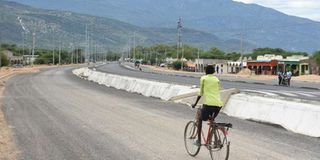Kainuk turns corner as peace returns to battle-scarred town

Kainuk trading centre in Turkana County on the Kapenguria-Lodwar road.
What you need to know:
- Today, the town, which lies on the border of West Pokot and Turkana counties, is attracting investors, after months of relative calm and peace.
- Another trader, Mr Pascal Omo, says Mlima Seker, a notorious hotspot, now hosts peace barazas.
For years, Kainuk has been a battlefield for the Pokots and Turkanas, rendering the Kitale-Lodwar road impassable.
Hundreds of people have died as a result of the conflicts fuelled by cattle rustling and land disputes. Anxiety, animosity and bloodshed were the order of the day, and trucks full of police officers would regularly be spotted along the highway, keeping vigil or escorting vehicles.
Today, the town, which lies on the border of West Pokot and Turkana counties, is attracting investors, after months of relative calm and peace.
A tour of the town by Nation recently revealed several high-rise buildings that are coming up, while its population is slowly increasing as trade and agriculture boom.
“There are days we could not operate freely like this. People avoided the town, and almost every day, we would hear gunshots and witness death. Raiders would storm police stations and even kill police officers before kidnapping businesspeople, raiding homes and attacking motorists along this road, which by then was not tarmacked,” Mr Josephat Ekwam, a businessman in the town, says.
Attacks
He adds that traders can now operate freely between the two counties without having to request for armed escort at Marich Police Station to escort them to Kakong. The stretch between Marich Pass and Kalemngorok was a banditry hotspot.
“It has been 11 months now since an incident was last reported. We have heard of attacks in other towns, but Kainuk has been peaceful, although members of the Turkana and Pokot still do not interact freely. They approach one another with mistrust, but we are optimistic that, with time, we will live freely,” Mr Ekwam says.
Another trader, Mr Pascal Omo, says Mlima Seker, a notorious hotspot, now hosts peace barazas.
“Leaders from the two counties are slowly embracing dialogue. There’s a time they could not see eye-to-eye, and this fuelled the animosity between the two communities,” Mr Omo says. He believes construction of the Kitale-Lodwar highway and Kainuk Bridge has helped because the police are able to patrol and respond to distress calls with ease.
Disarmament
He, however, urges the police to conduct disarmament in Kacheliba in Pokot North, Loruk in Baringo North, Lotubae in Turkana East and Marigat to restore peace in the region.
Rift Valley Regional Coordinator George Natembeya attributes the calm in Kainuk to the ongoing disarmament exercise that has seen the communities in the volatile areas surrender at least 120 firearms since the beginning of last year.
“We have had several peace meetings and we’re happy with the active involvement of the leaders in the peace talks,” Mr Natembeya says. In Kakong, the Rapid Deployment Unit, led by Mohamed Sheikh, has been going door-to-door, persuading locals to surrender illegally acquired firearms.
Leaders, including governors Stanley Kiptis of Baringo, John Lonyangapuo of West Pokot, and Josephat Nanok of Turkana, plus several MPs from the two counties, have been attending the regular meetings.
The administrator believes that at least 8,000 illegal weapons are being held by bandits and other criminals in the Rift Valley.




